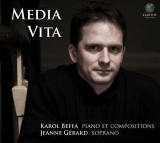Media Vita, der Titel dieses Albums, greift den Titel des Stücks für gemischten Chor auf, das Karol Beffa im Auftrag des Choreografen Julien Lestel für dessen Ballett Corps et Âmes geschrieben hat. Der Titel könnte sich auch auf die Media Vita des 48-jährigen Beffa beziehen, aber wie die CD zeigt, ist hier nichts von Midlife Crisis zu spüren. Beffas Einfallskraft ist ungebrochen reich.
Das Programm beginnt mit dem meditativen, sehr eindringlich interpretierten Stück De profundis für gemischten Chor und Viola und wird mit einem Klavierwerk fortgesetzt, welches das thematische Material von De Profundis aufgreift und somit die sanfte Stimmung des Chorwerks weiterführt und gleichzeitig etwas aufhellt.
Der Komponist spielt danach seine Sérénade d’hiver (2020) in a-Moll, die an das unberührte Weiß einer Winterlandschaft erinnern soll.
Jeanne Gérard singt mit ihrer reinen, fein timbrierten Stimme Deux Poèmes de Guillaume Apollinaire (2019). Beffa sagt dazu: « Apollinaire ist neben Baudelaire der Dichter, dem ich mich am nächsten fühle. Die Gedichte, die ich zu vertonen wählte, spielten beide mit Duplikationen und Symmetrieeffekten, die dem Titel des zweiten Gedichts nicht fremd sind. Während sich meine Interpretation von ‘Marie’ durch harmonisches Geklimper auszeichnet, habe ich bei ‘La Force du miroir’ von der Stimme getragene melodische Windungen bevorzugt, bevor ich mir ein Ende vorstellte, das sich in einem spielerischeren Klavierrausch verliert. » Es sind zwei schöne und einfühlsam vertonte Lieder, die sich auf hohem Niveau in das französische Liedgut einreihen.
Mit seinen verschwommen wirkenden Klängen evoziert Les Cités de l’oubli ebenso mysteriöse wie manchmal unruhige Stimmungen.
Media Vita ist inspiriert von dem gregorianischen Antiphon Media vita in morte sumus. « Die Archaismen in meinem Chorstück sind beabsichtigt, ebenso wie das homorhythmische Ende, in dem die wiedergefundene Konsonanz als Botschaft der Hoffnung verstanden werden kann », schreibt der Komponist.
Das nach einem Vers von Dante betitelte Klavierstück Nel mezzo del cammin (2020) ist thematisch mit Media Vita verknüpft und leitet über zu Rocking-Chair, das mit seinen schwingenden Klavierklang wiederum mit dem darauf folgenden Longing in the Boudoir verbunden ist, das zu den Fragments of China gehört, die auf Gedichte von Li Qingzhao, einer chinesischen Dichterin des 12. Jahrhunderts komponiert wurden. Die englisch gesungenen Lieder bilden einen Liebeszyklus ab, von der ersten Begegnung bis zu den Erinnerungen an eine verflüchtigte Liebe. Die wohl bewusst nicht idiomatisch klingenden Lieder profitieren von einer phantasievollen Klavierbegleitung, die wesentlich zur Verdeutlichung der Texte beiträgt. Das ergibt eine perfekte Tonsprache. Der Gesang von Jeanne Gérard ist untadelig, hochexpressiv und kommt mit dem Klavierpart voll zum Tragen.
Mit einem pianistischen Self-Portrait geht die CD stimmungsvoll zu Ende, die ein kohärentes, gut durchdachtes Programm des immer wieder überraschenden Komponisten Karol Beffa anbietet.
Media Vita, the title of this album, takes up the title of the piece for mixed choir that Karol Beffa wrote for choreographer Julien Lestel and his ballet Corps et Âmes. The title could also refer to the media vita of 48-year-old Beffa, but as the CD shows, there is nothing of midlife crisis here. Beffa’s inventiveness is unabatedly rich.
The program begins with the meditative, very hauntingly interpreted piece De profundis for mixed choir and viola, and continues with a piano work that takes up the thematic material of De Profundis, carrying on the gentle mood of the choral work while lightening it somewhat.
The composer then plays his Sérénade d’hiver (2020) in A minor, meant to evoke the pristine white of a winter landscape.
Jeanne Gérard sings with her pure, finely timbrated voice Deux Poèmes de Guillaume Apollinaire (2019). Beffa says, « Apollinaire is, along with Baudelaire, the poet to whom I feel closest. The poems I chose to set both play on duplications and symmetrical effects which are not unrelated to the title of the second poem. While my interpretation of ‘Marie’ is characterized by harmonic tintinnabulations, for ‘La Force du miroir’ I favored sinuous melodic lines in the vocal part before imagining an ending lost in the effervescence and playfulness on the piano. » These are two beautiful songs, sensitively set to music, that join the ranks of French song at a high level.
With its hazy sounds, Les Cités de l’oubli evokes moods that are as mysterious as they are sometimes unsettling.
Media Vita is inspired by the Gregorian antiphon Media vita in morte sumus. « The archaisms in my choral piece are intentional, as is the homorhythmic ending, in which the recovered consonance can be heard as a message of hope, » the composer writes.
The piano piece Nel mezzo del cammin (2020), titled after a verse by Dante, is thematically linked to Media Vita and leads into Rocking-Chair, which, with its swaying piano sound, is in turn linked to the Longing in the Boudoir that follows, part of Fragments of China, composed on poems by Li Qingzhao, a 12th-century Chinese poet. The songs, sung in English, depict a cycle of love, from the first meeting to the memories of a love that has faded. The songs, probably deliberately non-idiomatic in sound, benefit from an imaginative piano accompaniment that contributes significantly to the clarity of the texts. This makes for a perfect tonal language. Jeanne Gérard’s singing is impeccable, highly expressive, and comes into its own with the piano part.
A pianistic self-portrait brings the CD to an atmospheric close, a CD which is offering a coherent, well-conceived program by the ever-surprising composer Karol Beffa.
























